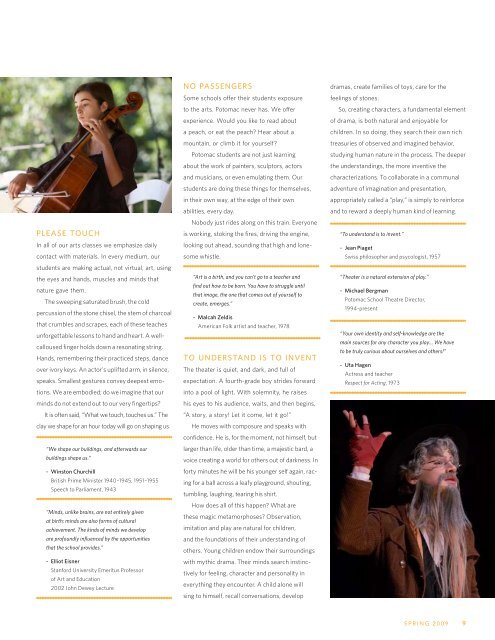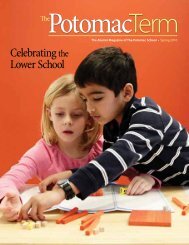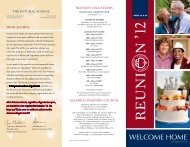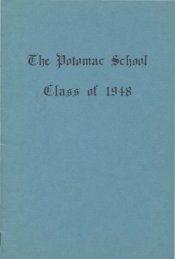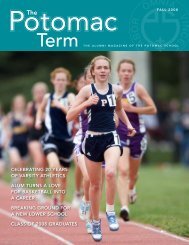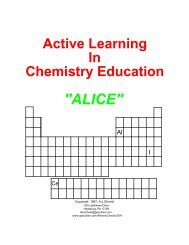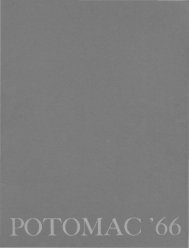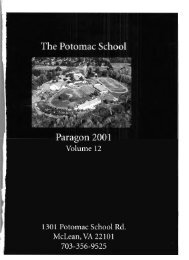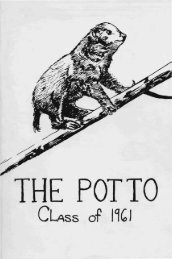Spring 2009 Potomac Term - Potomac School
Spring 2009 Potomac Term - Potomac School
Spring 2009 Potomac Term - Potomac School
Create successful ePaper yourself
Turn your PDF publications into a flip-book with our unique Google optimized e-Paper software.
Please Touch<br />
In all of our arts classes we emphasize daily<br />
contact with materials. In every medium, our<br />
students are making actual, not virtual, art, using<br />
the eyes and hands, muscles and minds that<br />
nature gave them.<br />
The sweeping saturated brush, the cold<br />
percussion of the stone chisel, the stem of charcoal<br />
that crumbles and scrapes, each of these teaches<br />
unforgettable lessons to hand and heart. A wellcalloused<br />
finger holds down a resonating string.<br />
Hands, remembering their practiced steps, dance<br />
over ivory keys. An actor’s uplifted arm, in silence,<br />
speaks. Smallest gestures convey deepest emotions.<br />
We are embodied; do we imagine that our<br />
minds do not extend out to our very fingertips?<br />
It is often said, “What we touch, touches us.” The<br />
clay we shape for an hour today will go on shaping us.<br />
“We shape our buildings, and afterwards our<br />
buildings shape us.”<br />
- Winston Churchill<br />
British Prime Minister 1940–1945, 1951–1955<br />
Speech to Parliament, 1943<br />
“Minds, unlike brains, are not entirely given<br />
at birth; minds are also forms of cultural<br />
achievement. The kinds of minds we develop<br />
are profoundly influenced by the opportunities<br />
that the school provides.”<br />
- Elliot Eisner<br />
Stanford University Emeritus Professor<br />
of Art and Education<br />
2002 John Dewey Lecture<br />
No Passengers<br />
Some schools offer their students exposure<br />
to the arts. <strong>Potomac</strong> never has. We offer<br />
experience. Would you like to read about<br />
a peach, or eat the peach? Hear about a<br />
mountain, or climb it for yourself?<br />
<strong>Potomac</strong> students are not just learning<br />
about the work of painters, sculptors, actors<br />
and musicians, or even emulating them. Our<br />
students are doing these things for themselves,<br />
in their own way, at the edge of their own<br />
abilities, every day.<br />
Nobody just rides along on this train. Everyone<br />
is working, stoking the fires, driving the engine,<br />
looking out ahead, sounding that high and lonesome<br />
whistle.<br />
“Art is a birth, and you can’t go to a teacher and<br />
find out how to be born. You have to struggle until<br />
that image, the one that comes out of yourself to<br />
create, emerges.”<br />
- Malcah Zeldis<br />
American Folk artist and teacher, 1978<br />
To Understand Is To Invent<br />
The theater is quiet, and dark, and full of<br />
expectation. A fourth-grade boy strides forward<br />
into a pool of light. With solemnity, he raises<br />
his eyes to his audience, waits, and then begins,<br />
“A story, a story! Let it come, let it go!”<br />
He moves with composure and speaks with<br />
confidence. He is, for the moment, not himself, but<br />
larger than life, older than time, a majestic bard, a<br />
voice creating a world for others out of darkness. In<br />
forty minutes he will be his younger self again, racing<br />
for a ball across a leafy playground, shouting,<br />
tumbling, laughing, tearing his shirt.<br />
How does all of this happen? What are<br />
these magic metamorphoses? Observation,<br />
imitation and play are natural for children,<br />
and the foundations of their understanding of<br />
others. Young children endow their surroundings<br />
with mythic drama. Their minds search instinctively<br />
for feeling, character and personality in<br />
everything they encounter. A child alone will<br />
sing to himself, recall conversations, develop<br />
dramas, create families of toys, care for the<br />
feelings of stones.<br />
So, creating characters, a fundamental element<br />
of drama, is both natural and enjoyable for<br />
children. In so doing, they search their own rich<br />
treasuries of observed and imagined behavior,<br />
studying human nature in the process. The deeper<br />
the understandings, the more inventive the<br />
characterizations. To collaborate in a communal<br />
adventure of imagination and presentation,<br />
appropriately called a “play,” is simply to reinforce<br />
and to reward a deeply human kind of learning.<br />
“To understand is to invent.”<br />
- Jean Piaget<br />
Swiss philosopher and psycologist, 1957<br />
“Theater is a natural extension of play.”<br />
- Michael Bergman<br />
<strong>Potomac</strong> <strong>School</strong> Theatre Director,<br />
1994-present<br />
“Your own identity and self-knowledge are the<br />
main sources for any character you play… We have<br />
to be truly curious about ourselves and others!”<br />
- Uta Hagen<br />
Actress and teacher<br />
Respect for Acting, 1973<br />
<strong>Spring</strong> <strong>2009</strong> 9


